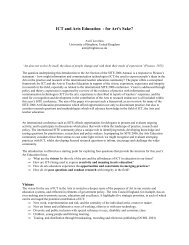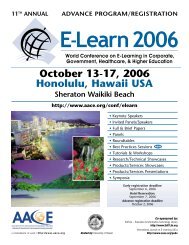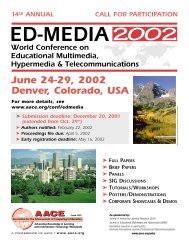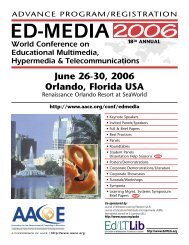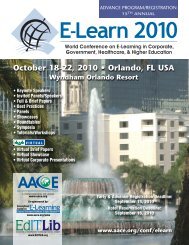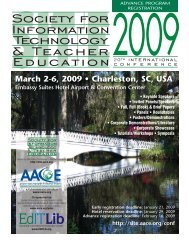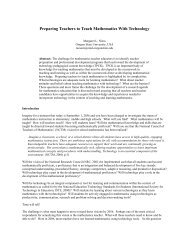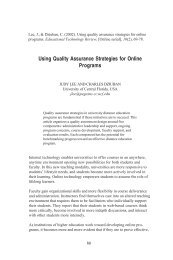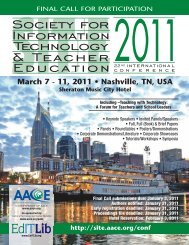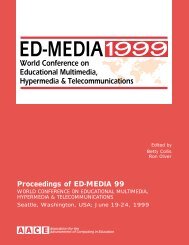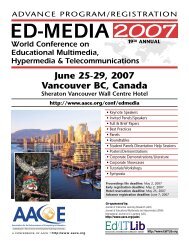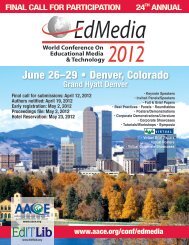ED-MEDIA 1999 Proceedings Book - Association for the ...
ED-MEDIA 1999 Proceedings Book - Association for the ...
ED-MEDIA 1999 Proceedings Book - Association for the ...
You also want an ePaper? Increase the reach of your titles
YUMPU automatically turns print PDFs into web optimized ePapers that Google loves.
(3) On-line Quiz--This component will be helpful <strong>for</strong> self-assessment. The quiz contains close-ended questions<br />
that can be used to gauge one’s understanding of <strong>the</strong> necessary skills and concepts of <strong>the</strong> topic.<br />
(4) Homework--This component provides <strong>the</strong> necessary in<strong>for</strong>mation and tools <strong>for</strong> working on <strong>the</strong> assignments.<br />
(5) Beyond <strong>the</strong> Basics--For <strong>the</strong> more advanced students, this component contains links to o<strong>the</strong>r relevant web pages<br />
and in<strong>for</strong>mation that encourage exploration beyond <strong>the</strong> minimum.<br />
(6) Discussion Corner--This area takes <strong>the</strong> <strong>for</strong>m of a threaded discussion. This is <strong>the</strong> place where <strong>the</strong> students can<br />
have asynchronous discussions and work collaboratively with <strong>the</strong>ir peers and <strong>the</strong> instructor. Students who have<br />
interesting questions or problems will be able to post <strong>the</strong>m to <strong>the</strong> discussion corner. O<strong>the</strong>r students, as well as <strong>the</strong><br />
instructor, will join in <strong>the</strong> discussions by providing answers, or hints to <strong>the</strong>se questions.<br />
(7) Tools--This component contains a collection of Java applets that are helpful in understanding and exploring<br />
<strong>the</strong> topic. These Java applets provide an opportunity to give a richer interaction with <strong>the</strong> material in terms of<br />
graphical exploration and calculations.<br />
(8) FAQ--Frequently Asked Questions from each topic will be included under <strong>the</strong> topic of <strong>the</strong> week. This<br />
component focuses on students’ questions ra<strong>the</strong>r than <strong>the</strong> instructor’s ideas.<br />
3. Pedagogical Approach<br />
In this setting, <strong>the</strong> web-site, toge<strong>the</strong>r with <strong>the</strong> email facility are integrated with <strong>the</strong> regular class meeting,<br />
class textbook, and lecture notes. The site is used as ano<strong>the</strong>r channel <strong>for</strong> students to seek feedback and help from<br />
<strong>the</strong> instructor and peers, to understand and explore more about <strong>the</strong> topics. The ultimate aim is to achieve teaching<br />
(as well as learning) <strong>for</strong> understanding. (Perkins, 1992)<br />
Basically, <strong>the</strong> ITC site is a second chance <strong>for</strong> a student who missed or needed to review <strong>the</strong> lesson(s) to<br />
acquire <strong>the</strong> clear in<strong>for</strong>mation of <strong>the</strong> topic. The Lecture Notes of <strong>the</strong> lesson of <strong>the</strong> week, in this case, Newton’s<br />
Method, not only teaches <strong>the</strong> learners <strong>the</strong> technique of applying <strong>the</strong> method, but also emphasizes how and when to<br />
use <strong>the</strong> method, in a concise manner. For students who need extra guidance, <strong>the</strong> step by step Guided Practice will<br />
equip <strong>the</strong> users with <strong>the</strong> necessary skills and concepts. The understanding of <strong>the</strong> concepts will be fur<strong>the</strong>r enhanced<br />
at <strong>the</strong> Discussion Corner and <strong>the</strong> FAQ, where <strong>the</strong> doubts and misconceptions will be discussed and clarified. The<br />
Java applets examples and tools will also help to make understanding <strong>the</strong> concept easier, both during <strong>the</strong> lecture<br />
and self-revision.<br />
From our experience as teachers, we know that if one can correctly explain a concept, she truly<br />
understands <strong>the</strong> concept. Thoughtful practices are enhanced by <strong>the</strong> assignments that focussed on assessing<br />
students’ understanding through open-ended questions (…/ITC/assign/index.html). Students are also encouraged<br />
to pose and answer questions, helping each o<strong>the</strong>r in <strong>the</strong> Discussion Corner (where <strong>the</strong>ir grades will be boosted by<br />
taking part actively in <strong>the</strong> discussions). In this way, <strong>the</strong> instructor, as well as <strong>the</strong> members of <strong>the</strong> class, will be <strong>the</strong><br />
key components in providing in<strong>for</strong>mative feedback to each o<strong>the</strong>r.<br />
On <strong>the</strong> whole, <strong>the</strong> existence of <strong>the</strong> web-site provides motivation. Older, re-entry students in general are<br />
back in school to achieve a specific goal: a diploma. They are (<strong>for</strong> <strong>the</strong> most part) extremely motivated to do well.<br />
Any opportunity <strong>for</strong> extra help and support will be motivating. Even if <strong>the</strong> student is not in a position to need<br />
extra help with <strong>the</strong> requirements, he will receive motivation in <strong>the</strong> extended opportunities in Beyond <strong>the</strong> Basics.<br />
Computer technology and <strong>the</strong> web make it possible to present graphs, figures, equations and text in an eyecatching<br />
appearing and meaningful manner. This might be enough to hook even <strong>the</strong> most nonchalant student.<br />
4. Discussion<br />
Some difficulties encountered during <strong>the</strong> trial run are: (1) Only half of <strong>the</strong> class (16 out of 31) have <strong>the</strong><br />
access to <strong>the</strong> WWW out of <strong>the</strong> campus, and not many students are posting and answering questions at <strong>the</strong><br />
Discussion Corner. It is thought that <strong>the</strong> situation could be improved by granting some financial aids in helping<br />
<strong>the</strong> students to gain access to <strong>the</strong> WWW. (2) Housing <strong>the</strong> web-site in <strong>the</strong> Polytechnic’s Internet server is<br />
inconvenient, not only in uploading files, but also in posting comments/questions at <strong>the</strong> ITC site. It is<br />
recommended that we should set up our own department’s server to alleviate some of <strong>the</strong>se problems.<br />
References:<br />
Perkins, D. (1992). Smart Schools: Better Thinking and Learning <strong>for</strong> Every Child. New York: The Free Press.<br />
Perkins, D. et al (1995). Software Goes to School: Teaching <strong>for</strong> Understanding with New Technologies. New<br />
York: Ox<strong>for</strong>d University Press.<br />
Brackett, G (1998). T525 course web-site. [Online: web]. Cited 22 Aug. 1998. URL:<br />
http://hgseclass.harvard.edu/t525/index.html



